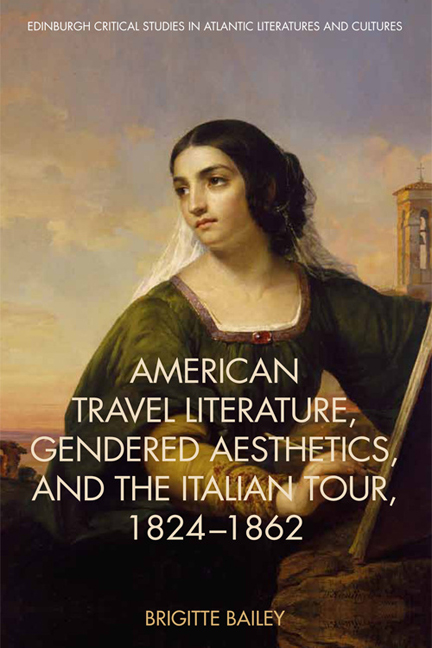Book contents
- Frontmatter
- Contents
- Illustrations
- Acknowledgments
- Introduction
- 1 Irving's Landscapes: Aesthetics, Visual Work, and the Tourist's Estate
- 2 The Protected Witness: Cooper, Cole, and the Male Tourist's Gaze
- 3 Gazing Women, Unstable Prospects: Sedgwick and Kirkland in the 1840s
- 4 Fuller and Revolutionary Rome: Republican and Urban Imaginaries
- 5 National Spaces, Catholic Icons, and Protestant Bodies: Instructing the Republican Subject in Hawthorne and Stowe
- Conclusion: Gender and Genre
- Notes
- Bibliography
- Index
5 - National Spaces, Catholic Icons, and Protestant Bodies: Instructing the Republican Subject in Hawthorne and Stowe
Published online by Cambridge University Press: 10 May 2023
- Frontmatter
- Contents
- Illustrations
- Acknowledgments
- Introduction
- 1 Irving's Landscapes: Aesthetics, Visual Work, and the Tourist's Estate
- 2 The Protected Witness: Cooper, Cole, and the Male Tourist's Gaze
- 3 Gazing Women, Unstable Prospects: Sedgwick and Kirkland in the 1840s
- 4 Fuller and Revolutionary Rome: Republican and Urban Imaginaries
- 5 National Spaces, Catholic Icons, and Protestant Bodies: Instructing the Republican Subject in Hawthorne and Stowe
- Conclusion: Gender and Genre
- Notes
- Bibliography
- Index
Summary
As the idea of a cathedral includes not only the central nave … [and] the massive buttress, but also the roses blooming in stone, … so in the idea of a state are comprehended, not only armies … and government … [but also] the arts.
George Stillman HillardOne could look down into the gloomy depths of the gorge, as into some mysterious underworld. Strange and weird it seemed, with its fathomless shadows and its wild grottoes, over which hung … long pendants of ivy, while dusky gray aloes uplifted their horned heads from great rock-rifts, like elfin spirits struggling upward out of the shade. Nor was wanting the usual gentle poetry of flowers; for white iris leaned its fairy pavilion over the black void like a pale-cheeked princess from the window of some dark enchanted castle… . A clear mountain-spring … fell with a lulling noise into a quaint mossgrown water-trough, which had been in former times the sarcophagus of some old Roman sepulchre …; a veil of ferns and maiden's hair, studded with tremulous silver drops, vibrated to its soothing murmur.
Harriet Beecher StowePerhaps more than any writer examined in this study, Harriet Beecher Stowe was an internationally known practitioner of a nation-producing genre by the time she traveled to Europe. Like Margaret Fuller, she grasped the possibilities of a popular print genre for reforming national subjectivities; her abolitionist novel Uncle Tom's Cabin (1852) was the most politically important and widely translated American novel of the nineteenth century and prompted her first European tour, in 1853, during which she was lionized in England. Like Nathaniel Hawthorne, she conflated travel writing with the novel; both wrote substantial descriptive passages based on their travels into the Italian romances they composed ten years after Fuller's coverage of the Roman Republic: Hawthorne's The Marble Faun, or, The Romance of Monte Beni (1860) and Stowe's Agnes of Sorrento (1862). And both also wrote travel accounts of their tours elsewhere in Europe: Stowe on northern Europe in Sunny Memories of Foreign Lands (1854) and Hawthorne on England in Our Old Home (1863).
- Type
- Chapter
- Information
- Publisher: Edinburgh University PressPrint publication year: 2018



